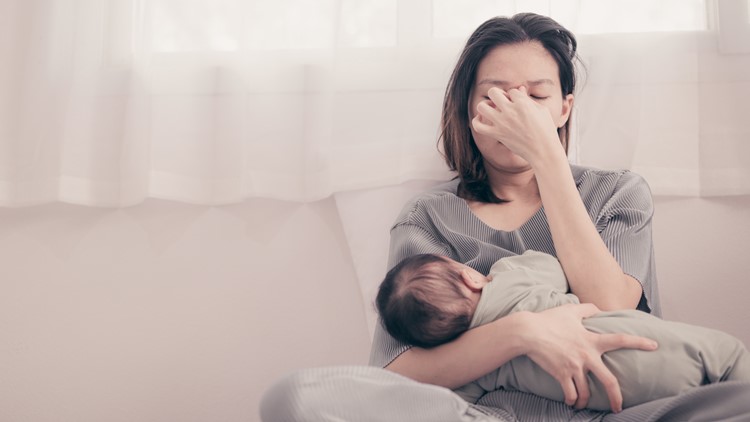SALEM, Ore. — Oregonians on Medicaid coverage who give birth and their children are now eligible for 12 months of medically necessary physical, dental, vision, and behavioral care through the state's health care plan.
Women who qualify for coverage through the Oregon Health Plan because of their pregnancy status had previously been limited to 60 days postpartum. The change took retroactive effect in April after the Oregon Health Authority (OHA) received federal approval from the U.S. Department of Health and Human Services to extend benefits for 12 months after giving birth.
“Just over 40% of births in the U.S. are under Medicaid. It’s at least that high in Oregon,” Patrick Allen, OHA Director, said during the June Oregon Health Policy Board Meeting.
The postpartum period is a critical time for both parents and babies, including physical recovery, breastfeeding support, mental health struggles, and managing health conditions that can be amplified by pregnancy.
The extension of postpartum care is aimed at furthering OHA’s goal of eliminating health care inequities by 2030.
A report published by the HHS Office of Assistant Secretary for Planning and Evaluation shows that pregnancy-related deaths are two to three times higher among Black non-Latino and American Indian/Alaskan Native populations compared to white populations.
One in three pregnancy-related deaths occur within the first year after childbirth, the report states.
How to get help
There's no need to enroll in a new program to receive the extension of care; those on the Oregon Health Plan will automatically receive the extended coverage if they are eligible during their pregnancy.
Medical providers have been notified of what the coverage can include, said Liz Gharst, OHA Health Policy Communications Officer.
This extension of care includes adding more robust vision and dental care for pregnant people, which is normally more limited, explained Erin Fair Taylor, vice president of Medicaid Programs at PacificSource Health Plans.
Taylor affirmed the importance of communication with providers and OHP users. She said anyone needing help navigating the health care system can call PacificSource at 888-977-9299 for help understanding what care is available to them, finding providers who accept OHP, and any other health navigation questions.
“We don’t want anybody to struggle on their own,” said Taylor. “We’re here to help.”
In-home support is still needed
Salem mom, Aracely Navarrete, understands postpartum struggles.
After a difficult labor and delivery about three years ago, which required her receiving two blood transfusions, Navarrete suffered from fatigue and mental health, all while trying to take care of a newborn.
“Needing to still heal myself, I found it incredibly difficult physically and mentally to care for my baby,” said Navarrete.
After intense exhaustion, Navarrete also struggled with breastfeeding.
“Looking back now, I wish there could have been some type of support for new moms that could provide in-home assistance,” said Navarrete.
The 12-month extended postpartum OHP coverage does not provide in-home support.
Navarrete expressed how helpful having help during the day would have been for her. She had the support of her mom and husband outside of working hours, but she was caring for her daughter on her own during the day.
“We need to take care of our new mamas if they are to provide a strong foundation for the health and happiness of these little babies,” said Navarrete. “If mom is unwell and unsupported, baby will be too.”
There is a shortage of doula care
Medical providers can recommend doula care for patients who are struggling to take care of themselves and their babies, but PacificSource only supports 15 hours of doula care using flex funds.
There also is a shortage of doulas, who provide non-clinical, in-home support in whatever way a client may need, said Annie Willems, a postpartum doula for Pacific Northwest Doulas in Salem.
“We turn away OHP clients every day because we don’t have enough doulas,” said Willems.
Additionally, finding a doula that is culturally aware and can speak a client’s first language can be a barrier.
“We can tell a client we have all this support, but it doesn’t really help if we don’t speak their language,” said Willems.
She said her office gets a lot of calls from people struggling to get appointments with their obstetrician or primary care physician and looking for some kind of support.
Local moms 'got no help' after giving birth
Several other local moms shared their postpartum struggles.
Katrina Rivera of Keizer said it was difficult to find dental clinics that accept OHP that weren’t completely booked.
Albany mom, McKenzie Kay, suffered from postpartum PTSD and had a hard time getting her medication refilled while waiting for continued OHP coverage.
Kay said she pleaded with her doctor and pharmacist, but was still unable to get the medication refilled.
“I had to pay out of pocket for them, which I didn’t have money for, so I abruptly stopped taking them instead,” said Kay.
“I was so lost and got no help,” she said.
Julia Regan of Salem struggled with postpartum depression and hypochondria following birth. Regan said she had to resort to getting support from other local mom’s and the community around her at six months postpartum.
“I hope these stories bring attention to postpartum and how important it is to get these mamas help when they need it,” said Regan.
Sydney Wyatt covers healthcare inequities in the Mid-Willamette Valley for the Statesman Journal. You can contact her at SWyatt@gannett.com, by phone (503) 399-6613, or on Twitter @sydney_elise44



